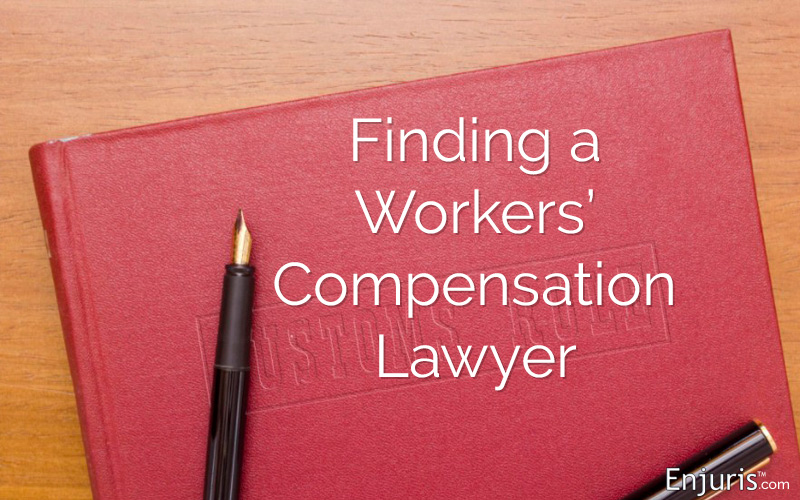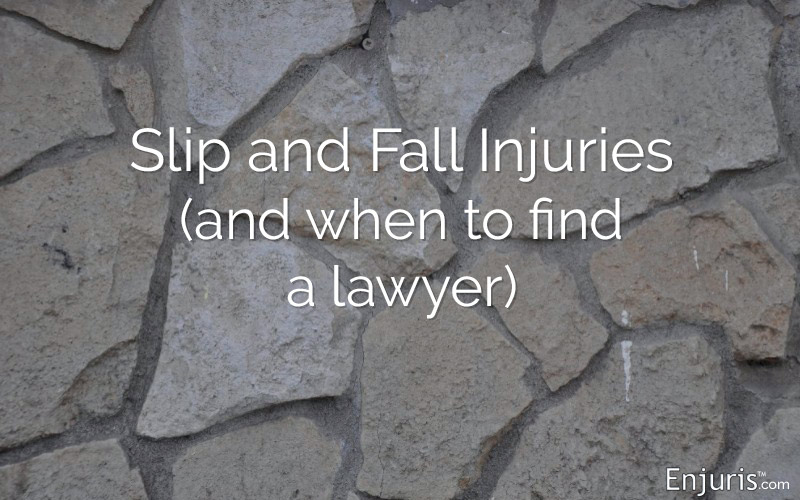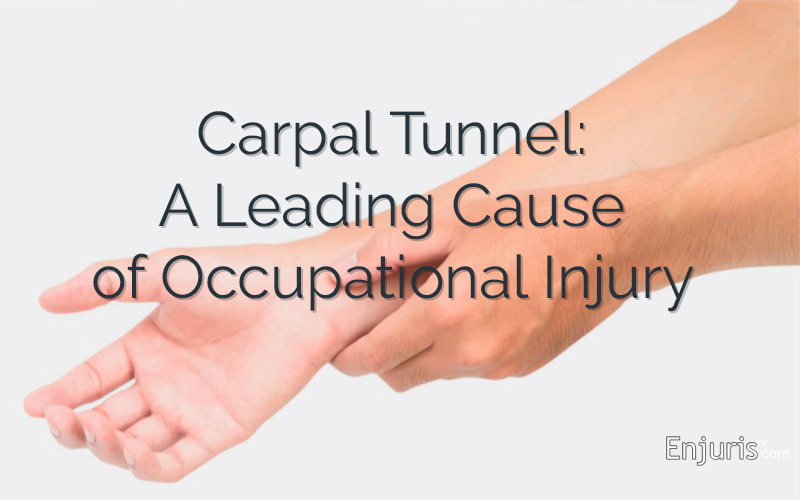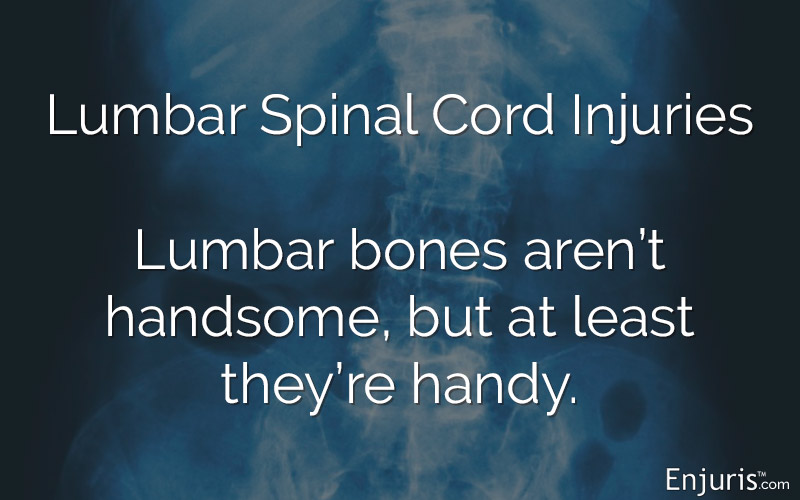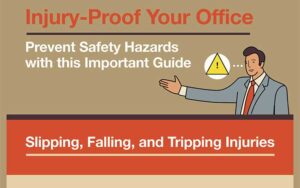A vital safety net for millions of laborers, factory workers and countless other jobs
Workers' compensation is a vital safety net for millions of laborers, clerks, factory workers and countless other jobs. Many of these occupations carry inherent risk to life and limb, and despite the best efforts of employers, workers, insurance companies and regulators, accidents and injuries do occur on the job.
Before the creation of a dedicated system nearly a century ago, injured workers would often find it difficult to obtain treatment for their injuries and compensation for lost wages.
Today, insurance for work injuries is a requirement for most employers. This essentially means the employer accepts financial liability for any on-the-job injuries – from a slip and fall to carpal tunnel syndrome – even if the incident was the worker's fault. In exchange for this coverage, workers cannot hold the employer liable for pain and suffering except in the most severe cases.
Workers' compensation: A complete guide
What can you do if hurt on the job?
If you are hurt and someone else is responsible, you can normally file a personal injury lawsuit to recover damages. However, if the injury happens at work, you will more than likely be filing a worker's compensation case to get your medical bills covered.
Workers' compensation is the general system of laws that provides certain benefits if you are injured while working for an employer, as well as the steps you must take to obtain benefits. Each state has its own specific workers' compensation laws. It's important for you to check the specific laws in your state. This article will outline workers' compensation principles so you will have a sense of what to do if you're injured at work.
Why workers' compensation?
Workers' compensation laws were set up to make sure that workers who suffer workplace injuries are appropriately compensated. The idea is to get your medical bills paid and to provide a percentage of your weekly salary so you don't have to file a lawsuit against your company (though you still can file a lawsuit in many states, however. We'll cover this later).
Workers' compensation is a really important safety net for most workers. It provides you with a certain amount of financial protection, but the employer gets a good deal as well; the laws limit how much you can get from your company, and the laws usually prevent you from suing your co-workers.
Workers' compensation is basically a no-fault set up.
That is, if you are hurt on the job, it is generally not a matter of determining if you were at fault or if the employer was at fault. You simply receive treatment for your medical bills and part of your salary through the workers' compensation program to which your employer belongs.
Exclusive remedy for most workers' comp cases
Usually, workers' compensation is your exclusive remedy for a job-related accident – that is, unless you can prove that a third party caused your injury. For instance, if you work on an assembly line and your hand is mangled in a machine that malfunctioned, you could in theory sue the manufacturer of that machine.
Employers usually stay out of these types of third-party claims, and these actions are civil lawsuits, not workers' compensation claims.
Some states will allow the worker's compensation insurance company and the employer to join a lawsuit that you filed against a third party. This allows the companies to recover the funds that they must pay you in worker's compensation benefits. Other states may allow the employer to get a lien against the amount you recover in the third-party lawsuit.
Workers' compensation scope
Coverage will vary widely depending upon your state and your job. Some states may exempt certain types of workers from workers' compensation systems:
- Agriculture workers
- Independent contractors
- Domestic workers
Other states will mandate coverage if the employer has a certain number of employees.
If you're hurt at work and you are not covered by workers' compensation, you still can talk to a personal injury attorney and file a lawsuit against your company or a third party.
Injuries covered under workers' compensation
You could receive compensation for these types of work-related injuries:
- Any preexisting condition or injury that your job makes worse, such as a back injury.
- Injury that occurs during a lunch break, 15-minute break, any work-sponsored event, or any work injuries caused by the employer's facilities, such as a broken chair in the break room.
- Serious diseases such as lung cancer or mesothelioma, if you can prove it was contracted by your presence on the job.
Injuries that may not be covered under workers' compensation include:
- Injury sustained when you are doing a personal errand off of company property.
- Horseplay at work that results in an injury.
- Some states will not provide benefits to a person who was hurt while intoxicated; however, if the employer provided alcohol at a company-sponsored event, you should speak to a workers' compensation attorney about this scenario.
Expenses covered under workers' compensation
Most workers' compensation insurance will cover:
- Medical bills from the injury
- Replacement of part of your income while you recover
- Retraining costs
- Partial compensation for permanent injuries
- Benefits to family of worker who dies on the job
Workers' compensation does not cover your pain and suffering. So, if you have very serious injuries, you may look at filing a personal injury lawsuit. This can be difficult to do, but there are exceptions.
For instance, if you think your employer intentionally caused your injury, you may be able to file a lawsuit instead. The most common reasons for this are:
- Battery
- Assault
- Intentional infliction of emotional distress
- Fraud
- Trespass
And, as noted earlier, if you were hurt on the job and you think a third party is to blame, you can sue that party.
Read our complete guide on the 7 steps of the workers’ compensation claim process.
What to do if you are hurt on the job
The process for filing a workers' compensation claim will be similar regardless of the state you are in. The time limit within which you must bring a claim may differ, for example. So, be sure to check your state's specific laws, which, again, can be found here.
Step 1
Report your injury
You have a certain number of days after your injury to report it to your company. You must report the injury in writing; a verbal communication is not enough. If you are seriously hurt and cannot report it, your relative or friend should do it for you.
Step 2
Seek medical care
Your company should have a list of healthcare professionals that can be used under their workers' compensation coverage. Select a provider from this list. Use them as your treating physician for your workers' compensation claim and all of your accident-related injuries
Step 3
Employer files claim with insurance
Your employer has a certain number of days to tell their insurance company about your injuries. If your injuries are very severe and you miss several days of work, your company may need to report the accident to the state.
Step 4
Insurer decision
The insurance company must make a decision within a certain timeframe after being informed of your injuries. The company will either accept or deny the claim. Common reasons for denied claims are lack of information or the insurance company believes your injuries weren't work-related. Get a definitive answer from the insurance company.
Step 5
Denied?
Talk to an attorney
If your workers' compensation claim is denied, you should talk to an experienced workers' compensation attorney immediately. He or she can determine if you have a strong case for appeal.
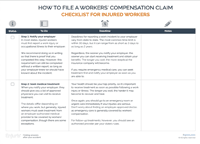 Workers’ Compensation Checklist
Workers’ Compensation Checklist
Download this checklist for injured workers to learn how to file a workers’ comp claim and track your progress.
Download in PDF format![]()
Did you know that workers' compensation law varies by state?
Tips for finding the best workers' compensation lawyer
What is the best way to hire a workers' compensation attorney? Is it different from hiring a lawyer who specializes in other areas? Read on to find out and learn some helpful tips for your own search.
- Workers' Compensation
- 10 Telltale Signs of a Bad Workers’ Compensation Attorney
- Carpal Tunnel: A Leading Cause of Occupational Injury
- Common Injuries that Affect Nurses and Other Health Care Professionals
- Common Reasons Workers’ Compensation Claims Are Denied
- Directory of State Workers' Compensation Agencies
- FedEx Employee Injuries & Workers’ Compensation Claims
- Guide to Severance Pay, Unemployment, and Workers’ Comp Claims
- Guide to Social Security Disability Benefits
- H2S Exposure Illnesses & Workers’ Compensation
- Health Care Workers Are Suffering From Mental Health Issues
- Hearing and Vision Loss in the Workplace
- How Much Does A Workers’ Compensation Lawyer Cost?
- How to Prepare for a Workers’ Comp Doctor Evaluation
- How to Prevent Cold Work Injuries
- How To Prove Workplace Defamation & Sue for Damages
- How to Report a Workplace Injury
- Lump Sum vs. Lifetime Benefits For Your Workers’ Comp Settlement
- Manhole Injury Lawsuits and Workers’ Compensation
- Repetitive Strain Injuries in the Workplace
- Seeking Financial Compensation for a Firefighter or EMT Injury
- The Most Common Types of Occupational Diseases
- The Most Dangerous Professions in America
- Third-Party Workplace Injury Claims vs. Workers’ Compensation
- Tips for Finding a Skilled Workers' Compensation Lawyer Near You
- Tips to Help Prevent Heat Related Injuries
- What If My Employer Doesn’t Have Workers’ Compensation Insurance?
- What is Hazard Pay, and Who Are Essential Frontline Workers?
- White Finger Syndrome and Workers’ Compensation
- Workers’ Comp for Flight Attendants & Other Airline Employees
- Workers’ Compensation After a Poultry Plant Injury
- Workers’ Compensation For Cell Tower Technicians














